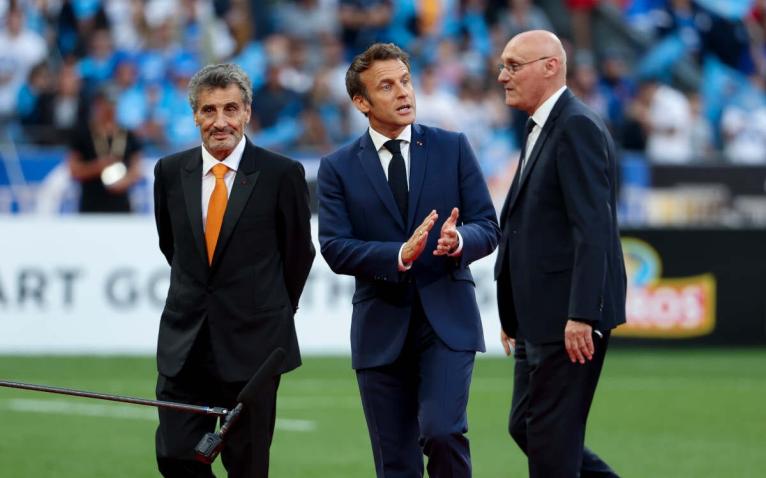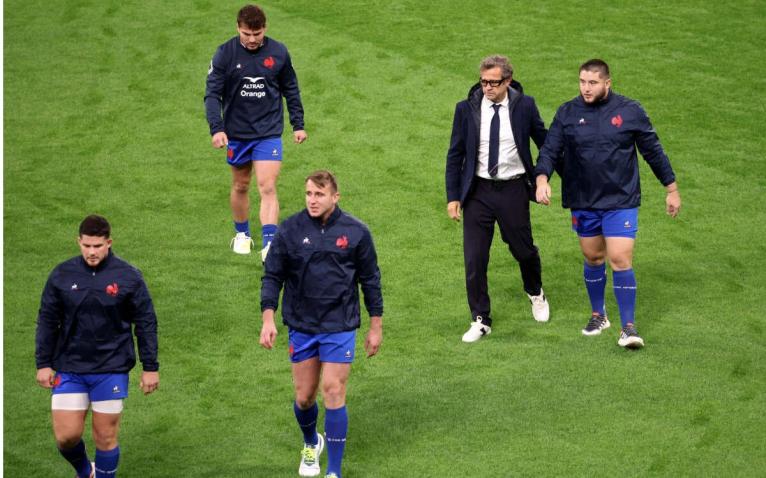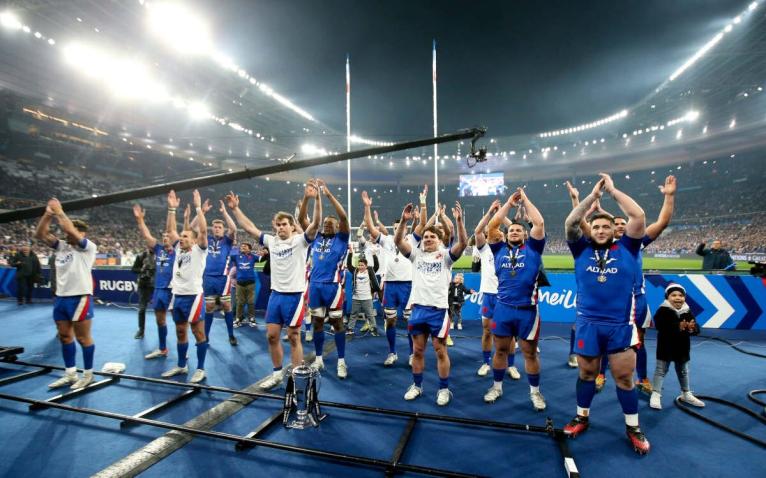Last week I was in a taxi in the Pyrenees driven by a man from Bayonne. He loved his rugby as much as me and our discussion covered everything from Eddie Jones to Biarritz to Antoine Dupont. Then I brought up Bernard Laporte. Should he stay or should he go? The driver puffed out his cheeks. The disgraced president of the FFR has brought shame on French rugby, he told me, referring to his conviction last month for corruption. I could sense a ‘But’ coming. “But he’s done great things for the national team. Without Laporte as president, Galthié would not be coach and France would not be winning.”
I had encountered similar sentiments in Montpellier, where I spent Christmas, which included a trip to their stadium to watch them demolish Perpignan. Neither Laporte or Montpellier owner Mohed Altrad (also convicted for corruption in the same trial) were much liked by the people I spoke to, but they were recognised as winners.
In the days after being handed a two-year suspended prison sentence Laporte came under great pressure to resign. Powerful figures such as the Minister of Sport, Amélie Oudéa-Castéra, the National League of Rugby [LNR], presidents of the amateur clubs and the FFR Ethics Committee indicated that they believed his time was up. An online poll on the influential Rugbyrama website found that was also the wish of an overwhelming majority of the public, and an editorial in Midi Olympique looked forward to his departure and the opportunity to restore the reputation of French rugby.
But Laporte didn’t fall on his sword. Summoned to the office of Oudéa-Castéra on December 22, he emerged after two hours to tell waiting reporters the talks had been ‘very constructive’.
He would not be resigning, merely ‘stepping aside’ until his appeal is heard.

In the interim a caretaker president will be elected by the 1,490 French clubs that comprise the FFR in an online vote in the week beginning January 23; a statement from Oudéa-Castéra’s office declared that the election “should be subject to democratic validation by the clubs, according to an irreproachable process and a precise and rapid timetable”.
The use of the word ‘irreproachable’ suggests that the Minister of Sport will be monitoring the election closely, to make sure it’s not a stitch-up by Laporte and his lackeys in the FFR. The federation’s vice-president is Serge Simon, Laporte’s right-hand man since he was elected president in December 2016, but it’s unlikely he will be appointed caretaker. Simon was also in the dock with Laporte and Altrad and, although he was acquitted, the financial prosecutor’s office has appealed this verdict.
The man expected to be voted the acting president is Patrick Buisson, in charge of amateur rugby at the FFR. He is a popular and unifying figure within the organisation and a man not tainted by a close association with Laporte.
France have a young and talented team, with several world-class players, two natural leaders in Antoine Dupont and Charles Ollivon, and a canny and complementary coaching staff.
It’s not an ideal situation at the start of what could be the most momentous year in the history of French rugby. Hosts of the Rugby World Cup, France are the bookmakers’ favourites to win the Webb Ellis Cup for the first time, a confidence born from a record-breaking 13-match winning streak that includes a 2022 Grand Slam and victories over New Zealand, Australia and South Africa.
France have a young and talented team, with several world-class players, two natural leaders in Antoine Dupont and Charles Ollivon, and a canny and complementary coaching staff.
The success of the Bleus in the last 18 months has gone a long way in erasing the memories of the last decade when France fell apart over the course of several seasons. They hit rock bottom in the quarter-final of the 2015 World Cup, crushed 62-13 by the All Blacks. It was a performance that emphasized the gulf in technique, temperament and fitness between France and the sport’s top nations.
Just over a year later Laporte was elected president of the FFR, and from that day began the regeneration of the national team. And therein lies the rub for those like Oudéa-Castéra who want Laporte out of the FFR; were that to happen might not the fortunes of France take a turn for the worse?

Midi Olympique, no particular fan of Laporte, acknowledged that he has been instrumental in re-establishing France as a major force in world rugby. He forced out Guy Noves as coach in 2017 after a run of miserable results (asked recently about the plight of Laporte, Noves said he ‘couldn’t be happier’) and set about assembling a dream team of coaches including Fabien Galthié, Shaun Edwards and Laurent Labit. He also hired Raphaël Ibañez as team manager, a popular and genial figure, the perfect foil to the mercurial Galthié.
But it is the relationship between Laporte and Galthié that has driven the rejuvenation of France. The pair are ruthless and egotistical, as well as rugby intellectuals, innovators in a country where the sport’s mindset is far more conservative than its Anglophone rivals. Laporte appointed Galthié as coach for these reasons, because they have the same rugby vision and the same visceral desire to make France great again.
Their relationship goes back a long way. When Laporte was appointed coach of France after the 1999 RWC, he made Galthié his scrum-half, rejuvenating a Test career that had failed to live up to its early potential in the 1990s. Galthié had won his first cap in 1991 but he made only six starts for France between the 1995 and 1999 World Cups. Charismatic, but also brusque and contrary, Galthié recognised in Laporte a kindred spirit. The respect was mutual and in 2001 Laporte appointed Galthié his captain, a position he held until he retired at the end of the 2003 World Cup.
For 20 years my destiny has been linked to Bernard’s, it’s a fact. A very strong link exists between us. He’s put his trust in me to get the French team back on the right track.
Fabien Galthie on Bernard Laporte in 2020
While England have drifted since 2019, let down by a lack of leadership within the RFU, France have made remarkable progress, shedding their reputation as a team who were physically unfit and temperamentally weak. France are now a team that plays for the full 80 minutes and know how to edge the tight matches.
Laporte won his bitter struggle with the LNR over player release, securing for Galthié and his staff preparation time with 42 players prior to Tests that is comparable to other nations. A decade ago, French players were required to play for their clubs in between Six Nations matches, while their rivals would have the weekend off.
Galthié’s appreciation is on-record. In September 2020 he bound his future to Laporte’s when he was asked about the impending FFR presidential election. How would you react if the challenger, Florian Grill, beat Laporte, he was asked? “I have weighed the words of what I am telling you,” he said. “For 20 years my destiny has been linked to Bernard’s, it’s a fact. A very strong link exists between us. He’s put his trust in me to get the French team back on the right track.”

Pressed on whether a defeat for Laporte might lead him to question his own future, Galthié replied: “The question does not arise today; it could arise after the elections. Indeed.”
Galthie’s loaded remarks were not appreciated by Grill’s campaign team, and with good reason. According to Midi Oympique they ‘perhaps proved decisive’ in securing Laporte a second term as president.
Not long after Laporte’s re-election, Galthié again endorsed his boss, declaring: “Our president is a great president. My personal feeling is that when one touches Bernard, one attacks the institution.”
Days after France won the 2022 Grand Slam (their first title for 12 years), Laporte announced that Galthié had extended his contract as head coach until 2028. “It’s not only a contract, it’s a project,” explained Galthié, who then thanked Laporte for support and the opportunity to coach France, adding: “I’m very fulfilled in this mission.”
What counts is the World Cup, the Bleus and general calm. It is not our intention to set rugby on fire even if we think the most dignified solution would have been the resignation of the [FFR] board.
Florian Grill
What Galthié has achieved with France has naturally attracted interest from elsewhere. He has reportedly received offers in recent months, including one from Japan, described by Midi Olympique as ‘huge’.
No one in France wants to lose Galthié, and that is probably why Laporte has been able to negotiate an honourable exit. His appeal won’t be heard until 2024, which is when his term of office expires. FFR rules stipulate that a president cannot serve for more than two successive terms; in other words, Laporte will leave office that year whatever the outcome of his appeal.
Florian Grill appears satisfied with the arrangement, acknowledging that “what counts is the World Cup, the Bleus and general calm. It is not our intention to set rugby on fire even if we think the most dignified solution would have been the resignation of the [FFR] board”.
It seems probable then that French rugby will negotiate its way through this grave scandal for the good of the game. A diminished and disgraced Laporte will suffice for his enemies, even if many of them would love to summon a taxi and seen him driven off into the distance.


Comments
Join free and tell us what you really think!
Sign up for free